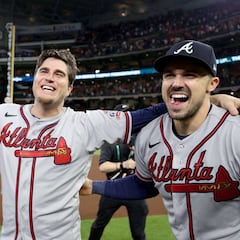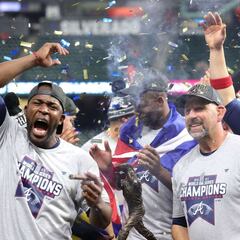Improbable Champions: How the Atlanta Braves won the World Series
The unlikely World Series win by the Atlanta Braves pits modern baseball tactics and conditioning against the raw instinct of baseball's old guard
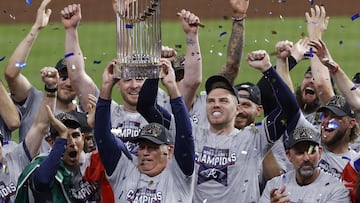

The 2021 season had so many improbables
That the Yankees wouldn’t get into the post season, nor would the Blue Jays, was unthinkable just a month ago. That Boston would be outgunned by Houston was extremely unlikely. That the Dodgers superb pitching would fall victim to the Braves bats was laughable. And yet, here we are. All of these things happened.
The Atlanta Braves went into the All-Star break with a losing record, finished the regular season with only 88 wins, out-pitched a Los Angeles Dodgers bullpen that is stacked with future hall of fame pitchers, and then followed that performance up by out-hitting the hottest batting order in MLB in the Houston Astros. To paraphrase the legendary Vin Scully, “In a season of the improbable, the impossible has happened.” The Atlanta Braves are World Series champions. The lowly, workaday, perpetually average Atlanta Braves are World Series champions.
The Braves were 44-45 at the All-Star Break.
— ESPN Stats & Info (@ESPNStatsInfo) November 3, 2021
Atlanta joins the 1964 Cardinals as the only teams to go from losing record at the All-Star Break to World Series champs. pic.twitter.com/ykNMPXln1m
Modern baseball switches the focus of play
In the 21st century, the game has been calibrated toward the short-work, bullpen-hungry type of play that Houston specialize in. Short outfields and the emphasis on power hitting tends to grind through ten or more pitchers per game, sometimes seeing aces being brought in solely to get one batter out. It is a style of play that team owners and television executives love, high scoring, thrill-a-minute play where every swing of the bat is a potential knockout punch. Brute force is prized heavily over the beautiful artistry of small-ball tactical play. Everyone seems to agree and all teams have adopted this style. And into this landscape of Goliaths, strolled David.
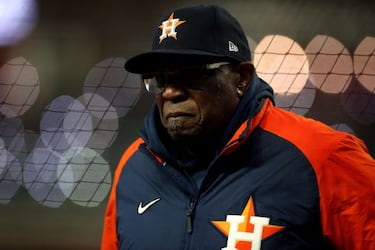
With the off-season widely expected to bring the designated hitter rule to the National League, you could be forgiven for thinking that tactical, solid, basics were out of date. For the first half of the season, it certainly seemed so. Even the venerable Dusty Baker seemed to wholeheartedly endorse this view when he suddenly adopted the shifted infield back in May. Houston’s overnight success appeared to validate the move. But through it all, Atlanta remained stubbornly traditional, obstinately married to their focus on a pitching staff that featured true starters, and finding hitters under every upturned stone. They lost two stars in Mike Soroka and Ronald Acuña Jr. and made a remarkable series of trading-deadline deals to get in hitting from all quarters, picking up Joc Pederson, Eddie Rosario, Adam Duvall and Jorge Soler.
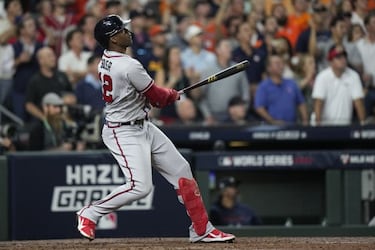
A celebration of time-honored fundamentals
The baseball savants assure us weekly that any baseball team that relies on small-ball tactics is anachronistic. Bases aren’t stolen, bunts aren’t lain down, pitchers shouldn’t throw 80 or 90 pitches per game. Small ball is dead, they say. But the success of the Atlanta Braves throughout the back end of the 2021 season and playoffs showed that a tactical view of the big picture can still win games, and win they did. Freddie Freeman and Austin Riley drew walks like flies, being selective with their shots and turning those shots into power. Ozzie Albies collected stolen bases throughout the season in the way that tourists collect refrigerator magnets. Their pitching staff was manned by true starters, players who would warm into a game and pitch confidently into six and seven innings every outing. AJ Minter, another of their trade deadline acquisitions, became an arm that could be trusted to bridge the two or three innings between starter and closer. After twenty years of increasingly specialized pitching across the Show, Atlanta’s resurrection of a type of pitching staff not common since the late 90s, an era of the workman, the journeyman, the pitcher who clocked in and put in a full day’s work in the office, has blown a breeze both cool and refreshing over this parched baseball landscape.
Massive strikeout of Yordan Álvarez by AJ Minter to get out of the third.
— Ethan Budowsky (@ethanbudowsky) October 27, 2021
Braves gonna need a lot of work from their bullpen tonight. Good news is they lead 5-0. pic.twitter.com/HLkaOBZ4w0
Related stories
Houston made their hay with the bat, and everyone, including this journalist, was convinced that the batting game would beat the pitching game in the end. That, after all, is the cut and thrust of the 21st century style of play. Specialize the pitchers to face and neutralize the obviously more explosive batting of the opponent. Don’t waste your time on a pitcher who has stamina. Instead, choose one who can dominate three or four hitters. The problem with this approach is that when these modern supremos see their best stuff fade, it falls quickly from “unhittable” to “batting practice”. The accepted solution for this is to replace them, early and often. And this is what brought the Dodgers to the edge of the World Series, what Houston’s supporters hoped would bridge the gap to their second title in four years. But Atlanta chose the road less travelled, sticking with the old ways, walking the tried and true path of riding the arm of a single pitcher, a pitcher whose 80th pitch was as powerful as his first, whose falloff is less pronounced, and who always appears hittable, but is rarely hit. It is readily understandable why teams have by and large abandoned this road, for this type of creature is a chimera, and pitchers like this must be molded from often unlikely clay. It is easy to spot a closer. Anyone who can throw a ball over 100mph can be relied upon to face three batters. A starting pitcher, a true starter, is a much more ephemeral being. And the factors that make for a good one are often intangible. Things like grit, determination, and coolness under pressure are not readily measurable with a radar gun. Houston kept diabolically bad hitter Martín Maldonado in their lineup precisely because, from the catcher’s position, he could impart some of these qualities onto their rotating pitching squad. He coached from the field. In having the more natural starting pitchers in their lineup, Atlanta were able to make use of Travis d’Arnaud behind the plate. Not as a coach or mentor, but for his explosive bat. In a league where the pitcher doesn’t bat, Maldonado fulfilled the same function as an automatic out.
The Braves saw Martín Maldonado, a man batting .098 in the postseason. Those in the Astros dugout saw Maldy, a Gold Glove catcher revered by his teammates and coaches for his attention to detail. His plate appearance turned a World Series game on its head: https://t.co/9GCITgCO1l
— Danielle Lerner (@danielle_lerner) November 1, 2021
I am not too proud to admit that I was wrong. I was wrong not in the assumption about batting winning out but in that I assumed that it would be Houston’s bats that were the more potent in the contest. Throughout the series, Atlanta’s hitters matched them shot for shot and proved to be just as explosive, just as capable, and just as reliable as their swing-for-the-fences opponent. Excellence in batting did win in the end, but it was the excellence of the Atlanta Braves that came out on top.
